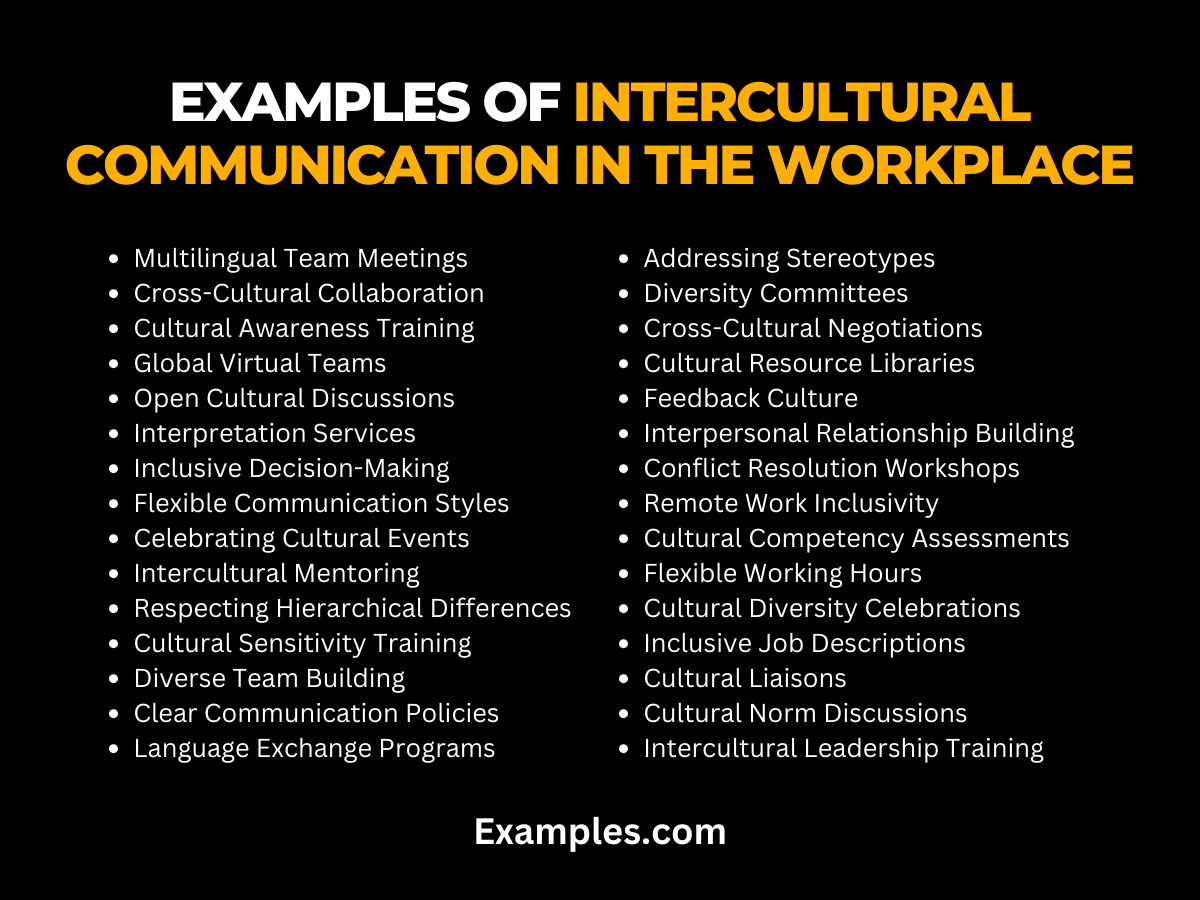29+ Intercultural Communication in the Workplace Examples
Dive into the intricacies of Intercultural Communication in the Workplace with our comprehensive guide. Unlock the secrets to fostering a collaborative and inclusive environment. This complete resource is packed with real-world Communication Examples, offering practical insights to navigate diverse work settings effectively. From decoding non-verbal cues to embracing cultural nuances, empower yourself with the knowledge to enhance workplace communication and build strong, multicultural teams. Elevate your professional interactions with this indispensable guide.
What is Intercultural Communication in the Workplace?

Intercultural Communication in the Workplace refers to the way people from different cultures interact and communicate within a work environment. It involves navigating diverse communication styles, respecting cultural differences, and promoting effective collaboration. This process ensures that individuals with varied backgrounds can understand each other, work together harmoniously, and contribute to a positive and inclusive workplace culture. In essence, it’s about fostering clear communication and mutual understanding among a culturally diverse group of professionals.
What is the best example of Intercultural Communication in the Workplace?

The finest illustration of Intercultural Communication in the Workplace is when colleagues from different cultural backgrounds collaborate seamlessly. They respect each other’s communication styles, celebrate diversity, and effectively share ideas. This example showcases a harmonious work environment where individuals bridge cultural gaps, leading to enhanced teamwork, mutual understanding, and a thriving professional atmosphere. It highlights the positive impact of intercultural communication on fostering unity and success within diverse workplaces.
30 Examples of Intercultural Communication in the Workplace

- Multilingual Team Meetings: Conducting meetings in various languages promotes inclusivity.
- Cross-Cultural Collaboration: Team projects that blend diverse perspectives lead to innovative solutions.
- Cultural Awareness Training: Providing sessions on diverse cultures enhances mutual understanding.
- Global Virtual Teams: Collaborating across borders through virtual platforms requires effective intercultural communication.
- Open Cultural Discussions: Creating a space for dialogue on cultural differences fosters understanding.
- Interpretation Services: Utilizing interpreters ensures clear communication in multilingual workplaces.
- Inclusive Decision-Making: Involving employees from various backgrounds in decision-making promotes equity.
- Flexible Communication Styles: Adapting communication styles to suit diverse preferences ensures clarity.
- Celebrating Cultural Events: Recognizing and celebrating cultural festivals enhances workplace camaraderie.
- Intercultural Mentoring: Pairing employees for mentorship across cultures promotes professional development.
- Respecting Hierarchical Differences: Acknowledging diverse approaches to hierarchy prevents misunderstandings.
- Cultural Sensitivity Training: Providing ongoing training to enhance cultural sensitivity in the workplace.
- Diverse Team Building: Organizing team-building activities that celebrate cultural diversity fosters unity.
- Clear Communication Policies: Establishing policies that emphasize the importance of clear communication in diverse workplaces.
- Language Exchange Programs: Encouraging employees to exchange language skills promotes mutual learning.
- Addressing Stereotypes: Creating awareness programs to challenge and overcome cultural stereotypes.
- Diversity Committees: Forming committees that focus on fostering diversity and inclusion in the workplace.
- Cross-Cultural Negotiations: Navigating negotiations with cultural sensitivity for successful outcomes.
- Cultural Resource Libraries: Establishing libraries with resources that educate on various cultures.
- Feedback Culture: Encouraging open and constructive feedback to enhance communication effectiveness.
- Interpersonal Relationship Building: Fostering genuine relationships that go beyond cultural differences.
- Conflict Resolution Workshops: Providing workshops on resolving conflicts in culturally diverse teams.
- Remote Work Inclusivity: Ensuring inclusivity in communication for remote team members from diverse locations.
- Cultural Competency Assessments: Evaluating and enhancing employees’ cultural competencies for better interactions.
- Flexible Working Hours: Accommodating diverse cultural preferences in work schedules.
- Cultural Diversity Celebrations: Organizing events to celebrate the diverse cultural backgrounds of employees.
- Inclusive Job Descriptions: Crafting job descriptions that attract candidates from various cultural backgrounds.
- Cultural Liaisons: Designating cultural liaisons to assist with intercultural communication challenges.
- Cultural Norm Discussions: Facilitating conversations on cultural norms to prevent misunderstandings.
- Intercultural Leadership Training: Training leaders to navigate and lead diverse teams effectively.
Importance of Intercultural Communication in the Workplace?
- Diverse Workforce Harmony: Intercultural communication ensures smooth collaboration among a diverse workforce, promoting unity and understanding.
- Reduced Misunderstandings: Clear communication across cultures minimizes misunderstandings, mitigating potential conflicts and enhancing cooperation.
- Enhanced Team Performance: Teams that master intercultural communication leverage diverse strengths, leading to improved problem-solving and innovation.
- Cultural Sensitivity: Fostering a culturally sensitive workplace creates an inclusive atmosphere, where employees feel valued and respected.
- Global Market Competence: In an interconnected world, intercultural communication skills empower businesses to navigate global markets successfully.
- Effective Leadership: Leaders proficient in intercultural communication inspire trust, manage diverse teams adeptly, and steer organizations toward success.
- Adaptability and Flexibility: Employees skilled in intercultural communication demonstrate adaptability, crucial for thriving in a constantly evolving business landscape.
- Conflict Resolution: The ability to navigate cultural nuances aids in effective conflict resolution, promoting a positive and cooperative work environment.
Rules of Intercultural Communication in the Workplace?
- Cultural Awareness Training: Provide employees with comprehensive cultural awareness training to foster understanding and sensitivity.
- Active Listening: Encourage active listening to grasp different perspectives, fostering open communication and reducing misunderstandings.
- Clear Communication Channels: Establish clear and accessible communication channels to facilitate dialogue among diverse team members.
- Language Sensitivity: Be mindful of language use, avoiding slang or idioms that may be misinterpreted, and promoting clarity in communication.
- Cultural Sensitivity: Foster a workplace culture that values and respects diverse cultural backgrounds, promoting inclusivity.
- Regular Feedback Sessions: Conduct regular feedback sessions to address concerns and ensure that communication practices are effective and understood.
- Flexibility and Adaptability: Embrace flexibility and adaptability in communication styles, recognizing that different cultures may have distinct approaches.
- Conflict Resolution Protocols: Develop clear protocols for conflict resolution that incorporate cultural considerations, promoting swift and fair resolution.
Impacts of Intercultural Communication in the Workplace?
- Enhanced Crisis Response: Proficient intercultural communication equips teams to respond effectively to crises, leveraging diverse perspectives and solutions.
- Cultural Sensitivity in Crisis Messaging: Intercultural communication ensures crisis messages are culturally sensitive, minimizing potential misunderstandings and panic.
- Global Team Collaboration: In crisis situations, intercultural communication facilitates seamless collaboration among global teams, optimizing crisis management strategies.
- Strengthened Team Cohesion: Teams that prioritize intercultural communication build stronger bonds, enhancing resilience and collective problem-solving during crises.
- Community Trust and Support: Cultivating intercultural communication builds trust within the workplace community, fostering support networks crucial during challenging times.
- Crisis Preparedness Through Diversity: Diverse perspectives, a product of effective intercultural communication, contribute to comprehensive crisis preparedness and planning.
- Adaptive Decision-Making: Intercultural communication skills enhance adaptive decision-making, allowing teams to pivot and address crises with agility and effectiveness.
- Employee Well-being and Mental Health: During crises, understanding cultural nuances in communication contributes to employee well-being, reducing stress and promoting a supportive work environment.



